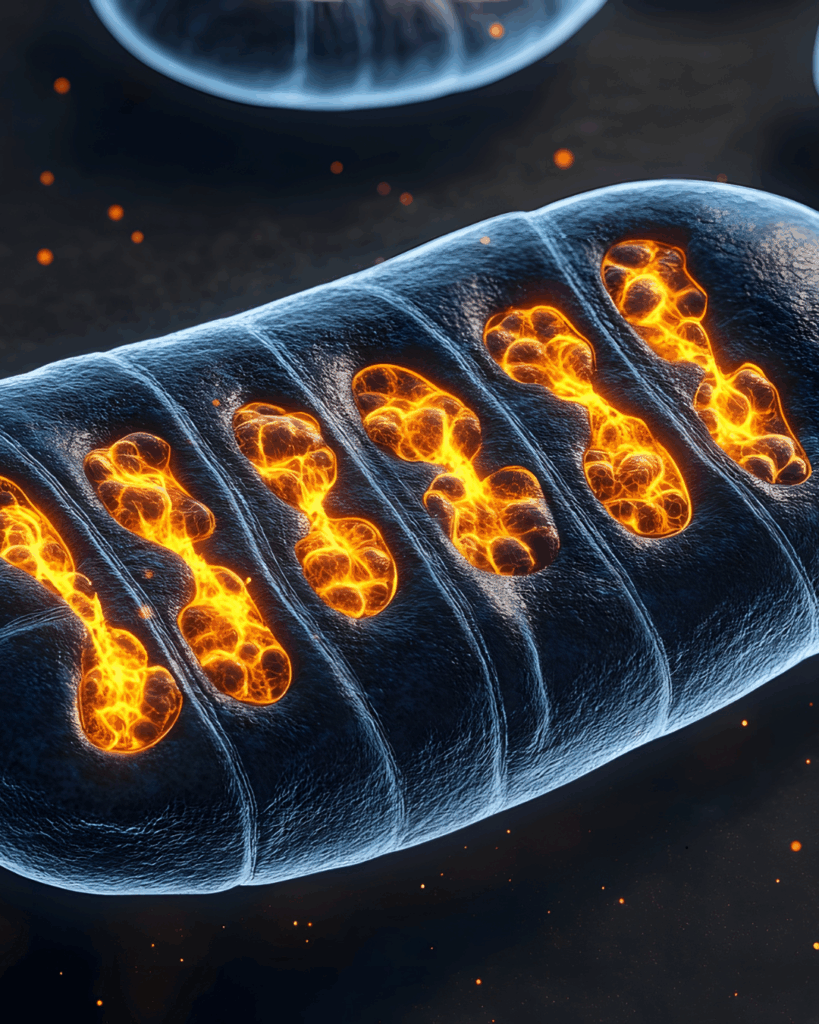Written by Lisa Edmondson – Women’s Health and Hormone Specialist – Nurse and Master Health Coach
When we think of thyroid health, most of us focus on hormones — T3, T4, and TSH. But underneath the surface lies a powerful link that often goes unnoticed: the relationship between mitochondria, our body’s energy factories, and the thyroid gland, the master regulator of metabolism. Understanding this connection can shed light on why fatigue, brain fog, and sluggishness are such common struggles in hypothyroidism — and how to support better energy from the inside out.
What Are Mitochondria?
Mitochondria are microscopic organelles inside nearly every cell of your body. Their main job is to produce ATP (adenosine triphosphate) — the molecule that fuels all cellular activity, from muscle movement to brain function to hormone production.
Think of them as the “batteries” of your cells. When mitochondria are healthy and abundant, you feel energised, clear-headed, and resilient. When they’re underperforming, every system in your body can feel like it’s running on low power.
The Thyroid’s Role in Energy Production
The thyroid gland regulates the speed at which your cells work — your metabolic rate. It does this through thyroid hormones, especially triiodothyronine (T3), which tells cells how much energy to produce.
- T3 boosts mitochondrial activity, increasing oxygen use and ATP production.
- Thyroid hormones also stimulate the creation of new mitochondria, a process called mitochondrial biogenesis.
When thyroid hormone levels drop, as in hypothyroidism, cells receive fewer “go” signals — slowing metabolism, reducing mitochondrial output, and ultimately leading to fatigue, weight gain, and cold intolerance.
How Hypothyroidism Affects Mitochondria
In hypothyroidism, several mitochondrial changes occur:
- Reduced ATP production: Cells can’t produce energy efficiently, contributing to tiredness and brain fog.
- Decreased oxygen utilisation: Mitochondria work less effectively, impacting muscle performance and stamina.
- Oxidative stress: Impaired thyroid function can lead to an imbalance between free radicals and antioxidants, damaging mitochondrial membranes.
- Altered fat and glucose metabolism: The body struggles to convert food into usable energy, compounding weight gain and sluggishness.
This is why many people with hypothyroidism still experience symptoms even when their lab results look “normal.” The issue may not be only hormonal — it’s also cellular.
Supporting Mitochondrial and Thyroid Health Naturally
Both the thyroid and mitochondria thrive under similar conditions — nutrient-dense foods, balanced stress, and proper rest. Here’s how to support both:
1. Prioritise Key Nutrients
- Iodine, selenium, and zinc for thyroid hormone production.
- B vitamins, magnesium, and CoQ10 for mitochondrial energy pathways.
- Iron and copper to help transport oxygen for energy production.
2. Reduce Oxidative Stress
- Eat antioxidant-rich foods like berries, leafy greens, turmeric, and green tea.
- Avoid excessive alcohol, processed foods, and smoking.
3. Support Mitochondrial Renewal
- Moderate exercise (like walking or resistance training) triggers mitochondrial biogenesis.
- Prioritise deep sleep — repair and regeneration happen overnight.
- Intermittent fasting or time-restricted eating may improve mitochondrial resilience (though not suitable for everyone with thyroid issues — seek professional guidance first).
4. Manage Stress
Chronic stress and high cortisol can suppress thyroid hormone conversion (T4 to T3) and impair mitochondrial function. Practices like yoga, meditation, time in nature, or deep breathing can help rebalance the system.
The Takeaway
Your thyroid and mitochondria work hand-in-hand to power every cell in your body. When one slows down, the other follows. By supporting both — through nutrition, movement, rest, and mindful stress management — you can begin to restore your natural energy, vitality, and metabolic balance.
Ready to Reignite Your Energy?
If you’ve been feeling flat, foggy, or fatigued despite “normal” thyroid tests, it may be time to look deeper. At Global Health, we take a whole-body approach — combining functional testing, nutritional strategies, and holistic care to help your cells (and your mitochondria) thrive again.
Book a consultation today to uncover the root causes of your low energy and take the next step toward restoring balance, vitality, and wellbeing.

